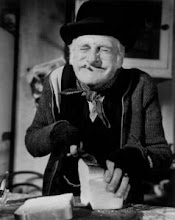 The Guardian reports today on the death of Marie Smith Jones (above) in Alaska aged 89. Why is her death significant? Well, with her died her native language - Eyak. An indigenous tongue of southern Alaska, the language has no 'close linguistic relatives' and so with the death of its last speaker has no chance of any kind of revival. The event raises a whole number of questions and issues tied to language generally - most obviously concerning the impact of globalisation on local cultures. Indiginous languages are increasingly finding themselves 'extinct' and many more will be lost throughout the next century. But - is this a case of linguistic Darwinism (some languages survive because they are fitter than others) or, as Mark Abley in The Guardian suggests, a cultural disaster equivalent to the bombing of the Louvre? The issues are enormously complex but one can't help but feel that the world is a poorer place without Marie Smith Jones.
The Guardian reports today on the death of Marie Smith Jones (above) in Alaska aged 89. Why is her death significant? Well, with her died her native language - Eyak. An indigenous tongue of southern Alaska, the language has no 'close linguistic relatives' and so with the death of its last speaker has no chance of any kind of revival. The event raises a whole number of questions and issues tied to language generally - most obviously concerning the impact of globalisation on local cultures. Indiginous languages are increasingly finding themselves 'extinct' and many more will be lost throughout the next century. But - is this a case of linguistic Darwinism (some languages survive because they are fitter than others) or, as Mark Abley in The Guardian suggests, a cultural disaster equivalent to the bombing of the Louvre? The issues are enormously complex but one can't help but feel that the world is a poorer place without Marie Smith Jones.Useful for: Language Topics / Change
